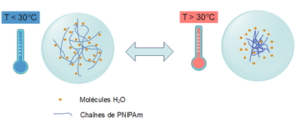
Coup de cœur RESEARCH
Spotlight on intelligent galenic models
Drug Delivery Systems (DDS) can be used to control doses, reduce the number of doses taken, and even improve compliance. Among DDS, polymers have been described as excipients in the galenic formulation of drugs (Nicolas & Couvreur, 2017). In particular, so-called “simple”, “stealth”, targeted polymer nanoparticles are smart materials in the sense that they release active ingredients given their sensitivity to stimuli such as pH, temperature, redox and polarity (Uddin et al., 2021).
Polymers and co-polymers based on poly (N-isopropylacrylamide) or PNIPAm are thermosensitive smart materials. Their LCST (Lower Critical Solution Temperature) is close to body temperature, around 32°C-35°C (Lanzalaco & Armelin, 2017). These thermosensitive polymers are hydrophilic below the LCST, forming a hydrogel network that traps the active ingredients, and become hydrophobic above the LCST, allowing them to be released.

Reversible phase transition of thermosensitive smart polymers based on poly (N-isopropylacrylamide) or PNIPAm
In the context of developing innovative materials in galenic formulation, the EBInnov® research unit has been working since 2021 in partnership with the Polymers & Composites (P&C) research team of the Processes & Engineering in Mechanics & Materials (PIMM) laboratory at the École des Arts et Métiers Paris Tech. EBInnov® is studying their active ingredient encapsulation/loading properties. For its part, P&C is seeking to understand the impact of thermal/hydrolytic aging on their physico-chemical properties. This project is being developed as part of Camille Mathieu’s thesis, co-directed by Samar Issa (EBInnov®) and Emmanuel Richaud (PIMM, P&C). It won the Call for Projects 2022 of Doctoral School 432 Engineering Sciences and Trades.
Find out more: Dr Samar ISSA, HDR











